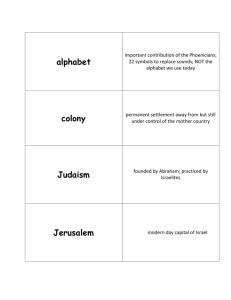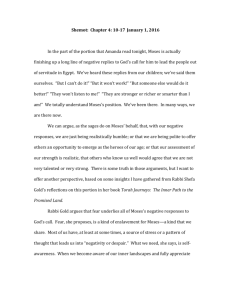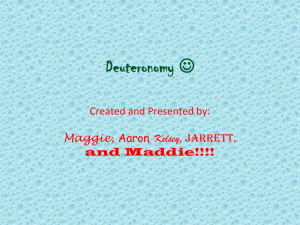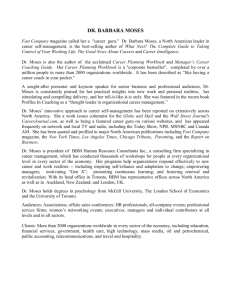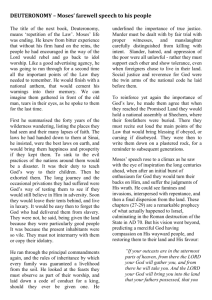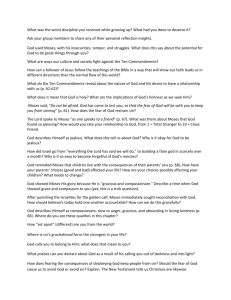Numbers 12: a Case Study in Some Methods of Jewish Bible Study
advertisement
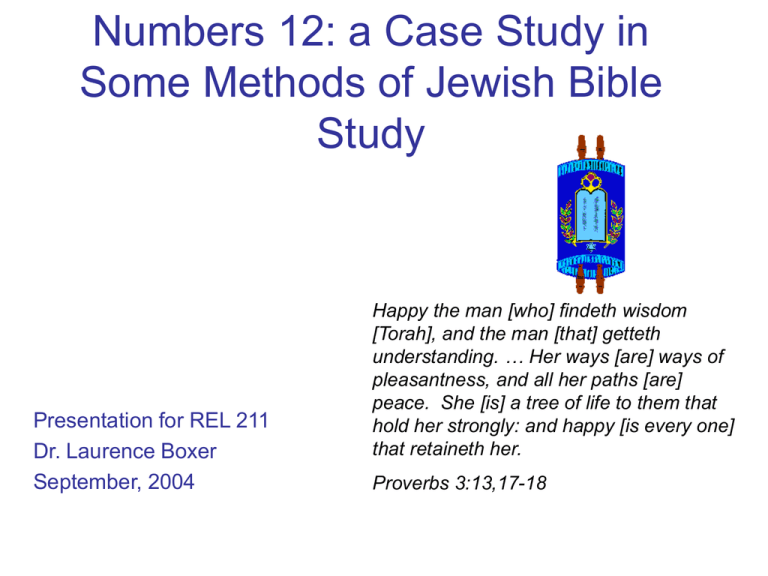
Numbers 12: a Case Study in Some Methods of Jewish Bible Study Presentation for REL 211 Dr. Laurence Boxer September, 2004 Happy the man [who] findeth wisdom [Torah], and the man [that] getteth understanding. … Her ways [are] ways of pleasantness, and all her paths [are] peace. She [is] a tree of life to them that hold her strongly: and happy [is every one] that retaineth her. Proverbs 3:13,17-18 Summary • Miriam and Aaron complain, unclearly, about Moses’ marriage. They compare themselves with Moses, implying by the comparison that something in Moses’ marriage is not like their marriages and therefore is not as it should be. • G-d rebukes them for comparing themselves with Moses, making clear Moses’ superiority. • Miriam becomes leprous (but not Aaron – presumably, Miriam led the offense, and Aaron went along with it). • Aaron pleads with Moses to help heal Miriam. • Moses utters a brief prayer on Miriam’s behalf. • Miriam is healed, but is quarantined for a week as punishment. • Out of respect for Miriam, the people wait for the end of her quarantine before resuming their travels. • “The Talmud, more than 1400 years old, can be considered the first hypertextual document. The text is self-referential, as the same material is discussed in many places. Each word of the text is also a jumping-off point to the thoughts of many commentators, both on and off the printed page.” [Roth:a] • “The Talmud is not a graded work. It doesn't move from the simple to the complex. To the contrary, every page of Talmud assumes the knowledge of all other pages of Talmud. That makes studying Talmud from the beginning very difficult for new students.” [Roth:b] • Talmud = “Oral Torah;” Jewish Bible = “Written Torah.” Talmud comments on and extends teachings of Bible. Statements similar to, if weaker than, R. Roth’s about Talmud can be made about the Jewish Bible. Rabbi Joel Roth Louis Finkelstein Professor of Talmud and Jewish Law at The Jewish Theological Seminary Num. 12:1: Miriam and Aaron spoke against Moses “( עלal”) – because of / on behalf of the Cushite woman he had married; for he had married a Cushite woman. Cushite usually rendered Ethiopian - black; “( עלal”) usually as “because of.” With these interpretations, are Miriam and Aaron advocating racism? Certainly, the Bible isn’t, since Miriam is divinely punished. Song of Songs: 1:5: I am black and beautiful…. 5:10: My beloved is white and ruddy…. Miriam and Aaron are regarded traditionally as admirable; Aaron, particularly, as resolver of conflict, promoter of peace. Thus, interpretations of verse 1 as advocating prejudice (racial or class) must be rejected. •If “black” is a racial term, we conclude the Bible does not oppose interracial coupling. •Alternately, “black” could be a class term, referring to those who work outdoors and are deeply tanned. Hence, interclass coupling is not Biblically opposed. “( עלal”) – “on behalf of” preferred interpretation – but, then, what is its significance? • [Midr on Ki Thetze VI,14]: “Rabbi Simeon said: … Miriam the pious … had no intention to slander [Moses], but only criticised him because of his neglect for his marital duty….” (See also [Midr on Ve’zot Ha’brachah XI,10]: “… the son of Amram from the day Thou didst reveal Thyself to him at the Bush has had no marital relations….”) •Why does Midrash teach that Moses neglected/separated from his wife? •Num. 12:2: They said, “Has the Lord spoken only through Moses? Has He not spoken through us as well?” The Lord heard it. •Ex. 19:14-15 (preparation for revelation of 10 Commandments): Moses came down from the mountain to the people and warned the people to stay pure, and they washed their clothes. And he said to the people, “Be ready for the third day; do not go near a woman.” •Moses concluded that since he could be summoned by G-d any time, he should separate from his wife. Miriam and Aaron argue that they are also prophets, but they have not separated from their spouses. Thus, on behalf of the Cushite woman he had married, Miriam and Aaron advocate that Moses resume normal marital life. •Further evidence for this interpretation is found in response to the question: Why were Moses’ sons undistinguished? Why were Moses’ descendants undistinguished? • Aaron’s sons and grandsons assisted him, succeeded him as priest. • Miriam’s husband Hur is identified as grandfather of Bezalel, architect of Tabernacle (Ex. 31:1). • Moses’ sons Gershom (Ex. 2:22, 18:3) and Eliezer (Ex. 18:4) are barely mentioned in the Torah. • Judges 18 discusses a time of idolatry in the tribe of Dan. The priest of the idolatrous cult is identified (18:30) as Jonathan, son of Gershom, son of Manasseh. Manassah is normally written in Hebrew as ( מנשהMenashe) but appears in Judges 18:30 as suggesting ( משהMoshe – Moses) – i.e., the upraised letter נis perhaps an inserted change from the original to diminish Moses’ disgraced grandfatherhood. Thus, Moses’ excessive devotion to public duty caused him to neglect family, with tragic consequences. See [Schorsch] Num. 12:3: Now the man ( האיש- ha-ish) Moses was very meek, more than all men on the face of the earth. • What is the significance of the man? Why doesn’t the text simply say Now Moses was very meek…? Note other unusual uses of man: • Ex. 15:3: The Lord is a man ( – אישish) of war…. [Don’t we prefer to praise G-d as source of peace?] • Num. 11:16-17: And the Lord said to Moses: “Gather unto Me seventy men ( – שבעים אישshiv’im ish – literally, seventy man) of the elders of Israel, … and they shall bear the burden of the people with thee, that thou bear it not thyself alone. • Latter verses are about appointment of leaders. Linkage among these verses: shared unusual use of man ( – אישish). Lesson: A leader needs the strength of a warrior in order to lead, but ideally should have humility of Moses, to listen, be sensitive to the needs of those he/she leads. See [Frand; Haber; Midr on Behaalotekha, 15:23] • Num. 12:6-8: and He said: ‘… when a prophet arises among you, I make Myself known to him in a vision, … in a dream. Not so with my servant Moses; he is trusted throughout My household. With him I speak mouth to mouth, plainly and not in riddles…. How then did you not shrink from speaking against my servant Moses!’ •Deut. 32:1: Give ear, O heavens, let me speak; let the earth hear the words I utter. •Isaiah 1:2: Hear, O heavens, and give ear, O earth, for the Lord has spoken. Note Moses is more intimate with heavens (“Give ear, O heavens” vs. Isaiah’s “Hear, O heavens”) and speaks more independently (“hear the words I utter” vs. “for the Lord has spoken”). See [Rappel] Deut. 34:10: Never again did there arise in Israel a prophet like Moses, whom the Lord singled out, face to face. Thus, Moses is the greatest of the prophets, for all time. This is one of Maimonides’ 13 Principles of Faith (see [Or, p. 53]); Christianity and Islam clearly believe differently. See also the lengthy Midrash on this point in [Midr on Ve’zot Ha’brachah, 11:3]. Num. 12:10: And when the cloud was removed from over the Tent, behold, Miriam was leprous…. • Leprosy = מצורע- metzorah, regarded as an abbreviation for the expressions מוציא רע- motzi rah – one who brings forth evil, and מוציא שם רע- motzi shem rah – one who brings forth an evil name, by evil speech or gossip [Midr on Lev., 16:1]. “Leprosy” was not what is today called by that name. Rather, was regarded as divine punishment for evil speech. Thus, a slanderer is a moral leper [Hertz, p. 461]. • The victim of leprosy was quarantined and ostracized for 2 weeks or more, depending on recovery – see Lev. 13. • Rituals of purification upon recovery include dabbing oil, as described in Lev. 14:17: • “… on the tip of the right ear [stressing need to hear the words of G-d] of him that is to be cleansed, and • upon the thumb of his right hand [stressing need to perform G-d’s commands], and • upon the great toe of his right foot [stressing need to walk in G-d’s ways]…” Torah tradition regards evil speech as one of the most serious moral failings. • Slander kills 3: the victim, the teller, and the hearer [Hertz, p. 315, citing ancient sources]. • Note disapproval, penalties against malicious dishonesty (Ex. 20:13, 23:1-2, Deut. 19:16-19, 22:13-18, etc), gossip (Lev. 19:16). • [Talmud, Pesachim 118a]: R. Shesheth … on the authority of R. Eleazar b. Azariah: Whoever relates slander, and whoever accepts slander, and whoever gives false testimony against his neighbor, deserve to be cast to dogs, for it is said, ye shall cast to the dogs [Ex. 22:30], which is followed by Thou shalt not take up a false report [Ex. 23:1]…. • “The slanderer, the man of the evil tongue, the calumniator, is worse than a murderer, since he destroys a man’s reputation, which is more precious than his life (Talmud)” [Hertz, p. 501]. This is hinted at in Lev. 19:16: Thou shalt not be a רכילrachil – pedlar/gossip/pedlar of gossip among your people; do not stand idly by the blood of your neighbor…. • The lessons cited above are examples of learning from proximity – that nearby phrases or verses often illuminate each other (here, juxtaposition of casting to dogs and rumor-mongering; of gossip and bloodshed). A Chassidic Story – Gathering the Feathers • A man appeared before his rabbi prior to Rosh Hashanah, declaring he wished to repent the slander he had committed. He claimed he would do anything the rabbi instructed him. • The rabbi doubted the man’s sincerity. He told him to rip open a feather pillow, scatter the feathers to the winds, and return to the rabbi’s office for further instructions. • The man thought the rabbi’s instructions odd, but did as instructed. • When he returned to the rabbi, the rabbi instructed him to gather the feathers – every last one. • The man protested the impossibility of the task. • The rabbi said, “The feathers are your words. Just as you cannot gather the feathers, you cannot undo your slander. The way to eliminate the harm of slander is not to engage in it in the first place.” Lessons from other techniques of Torah study • We have, above, illustrated lessons learned in hypertext style, Midrash (imaginative investigation), and from proximity. • There are many other methods of deriving lessons from the Torah. • Among the more prominent: P’shat – the “plain meaning of the text” Logical deduction • We consider other lessons learned from Num. 12 using these methods of study. Num. 12:11-12: Aaron pleads with Moses to alleviate Miriam’s leprosy. • Num. 12:13: So Moses cried out to the Lord, saying, “G-d, please heal, please, her!” (literal translation of )אל נא רפא נא לה • Despite the repetition of “please,” note the brevity of Moses’ prayer. • “Moses is caught in a dilemma. On the one hand, Miriam had spoken openly against him and deserved to be punished. On the other hand, as his sister, she evoked his compassion. The result is this terse prayer. Its brevity seems to reveal Moses’ lack of enthusiasm and minimal compliance with Aaron’s plea.” [Etz, p. 835] • Alternately: Moses was shy about publicly favoring his sister, “lest the Israelites say, ‘For his sister, he pleads with G-d at length, but were we in her place, he would only offer a few words.’” [Etz, p. 835, citing Sifrei] • Alternately: This confirms the greatness of Moses. He is so intimate with G-d that these five words are all he needs to say. Contrast with the more verbose pleas of Abraham on behalf of any righteous residents of Sodom and Gomorrah (Gen. 18:16-33), and those of Jacob when he requested divine protection from Esau (Gen. 32:1013). •Num. 12:14-15: But the Lord said to Moses, “If her father spat in her face, would she not bear her shame for seven days? Let her be shut out of the camp for seven days, and then let her be readmitted.” So Miriam was shut out of the camp seven days; and the people did not march on until Miriam was readmitted. Lessons from P’shat (plain meaning) and logical deduction: • Infinitely greater than a human father, G-d might have insisted on a more severe punishment, but instead gave Miriam a reduced penalty (lepers were ordinarily quarantined at least 2 weeks – Lev. 13:5). G-d is humble and forgiving; how much more should we be humble and forgiving. • Even the most righteous of individuals is not perfect. An occasional misdeed need not diminish one’s stature in the eyes of others. “… the people did not march on until Miriam was readmitted” – she remained respected. References • • • • • • • • • • [Etz] Etz Hayim: Torah and Commentary, Rabbinical Assembly, United Synagogue of Conservative Judaism, New York, 2001 [Frand] Rabbi Yissocher Frand, Commentary on Behaaloscha, http://www.torah.org/learning/ravfrand/5757/behaaloscha.html [Haber] Rabbi Yaacov Haber, Commentary on Lech Lecho, http://www.ou.org/torah/haber/lechlecha47.html [Hertz] Dr. J.H. Hertz, ed., The Pentateuch and Haftorahs, 2nd ed., Soncino Press, London, 1968 [Midr] Midrash Rabbah (ancient Biblical commentary) – see The Midrash, Soncino Press, London, 1961 [Or] Or Hadash: A Commentary on Siddur [prayerbook] Sim Shalom, Reuven Hammer, ed., Rabbinical Assembly, United Synagogue of Conservative Judaism, New York, 2003 [Rappel] Dov Rappel, Commentary on Beha’alotekha, http://www.biu.ac.il/JH/Parasha/eng/behaalot/rap.html [Roth] Rabbi Joel Roth, “Introduction to Talmud,” a) http://courses.jtsa.edu/registration/syllabi/talmud_ae/ b) http://courses.jtsa.edu/tal/introdemo/demo/home.html [Schorsch] Rabbi Ismar Schorsch, Commentary on Beha’alotekha, http://learn.jtsa.edu/topics/parashah/5755/behaalotekha.shtml [Talmud] The “Oral Torah” consisting of many volumes, thousands of pages of commentary and elaboration on the Jewish Bible. See The Talmud, Soncino Press, London, 1961


